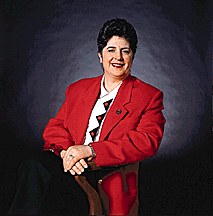

Nursing Professor Diana J. Wilkie's boundless capacity for hard work and passion for relieving intractable pain are some reasons why she is the 1996 recipient of the UW's Outstanding Public Service Award.
Described by her colleagues in the Department of Biobehavioral Nursing and Health Systems as selfless, tireless and extraordinarily competent, Wilkie is an expert in the assessment and management of pain, especially pain associated with cancer.
"We have the right to be free of pain," says the soft-spoken Wilkie. "Pain serves to help with diagnosis, but there is no reason to hurt, once diagnosis is achieved and therapies have begun."
Freedom from pain--despite severe illness--is a motto Wilkie carries with her in all her activities: her extensive research, her pro bono consulting in the medical community, her mentoring of nursing students, and her work with individual patients, nurses and doctors.
"Typically, her service is in medically underserved and remote corners of the state," says colleague Eleanor Bond. "She shares new findings about pain management and invites the audience to contact her, resulting in hundreds of hours of consultations, always provided without charge."
"We are extremely fortunate that she chooses to give selflessly to those in our community," says Nursing Professor Joan Shaver, chair of Wilkie's department, "be they people in pain or colleagues and students with the potential to alleviate suffering."
Wilkie's work has recently become more visible with the inauguration of the School of Nursing's Comfort Coach, a motor home equipped as a traveling research lab. The coach travels to various hospitals in the region, furthering Wilkie's research into relieving the pain of lung cancer patients.
Born into a poor farm family in Colorado, Wilkie has a strong sense of obligation to give back to the community. After receiving her Ph.D. from UC-San Francisco, she came to the UW in 1990, largely because of the presence here of the late Anesthesiology Chair John Bonica.
Asked if, like Bonica, personal experience led her to pursue the relief of pain as her calling, she recalls a turning point in her career. "I was an assistant head nurse in Colorado in 1981, caring for a man dying of cancer. I didn't know how to take care of his pain. Because of the press of work, we couldn't get to him to give him all the doses of pain medication prescribed. He spent three weeks in awful pain before he died." With that memory haunting her, she resolved to learn all she could about effective pain relief.
Ironically, says Wilkie, despite great advances in pain-relief drugs, many health care providers aren't well informed enough to keep patients pain-free. "My passion is to help nurses and physicians understand this, to show them that people don't have to hurt."
She believes that the assisted suicide movement would not enjoy so much support, if people knew their pain could be adequately controlled.
While some health professionals have concerns about over-prescribing narcotic pain medications, Wilkie says studies show that less than one patient in 3,000 has problems with addiction. "We're taught to grin and bear it, and to under-report pain," she says, "but pain is a detriment to our immune systems; pain itself can kill."--Laurie McHale, Health Sciences News and Community Relations
Send a letter to the editor at columns@u.washington.edu.
Return to Best of 1996 Home Page